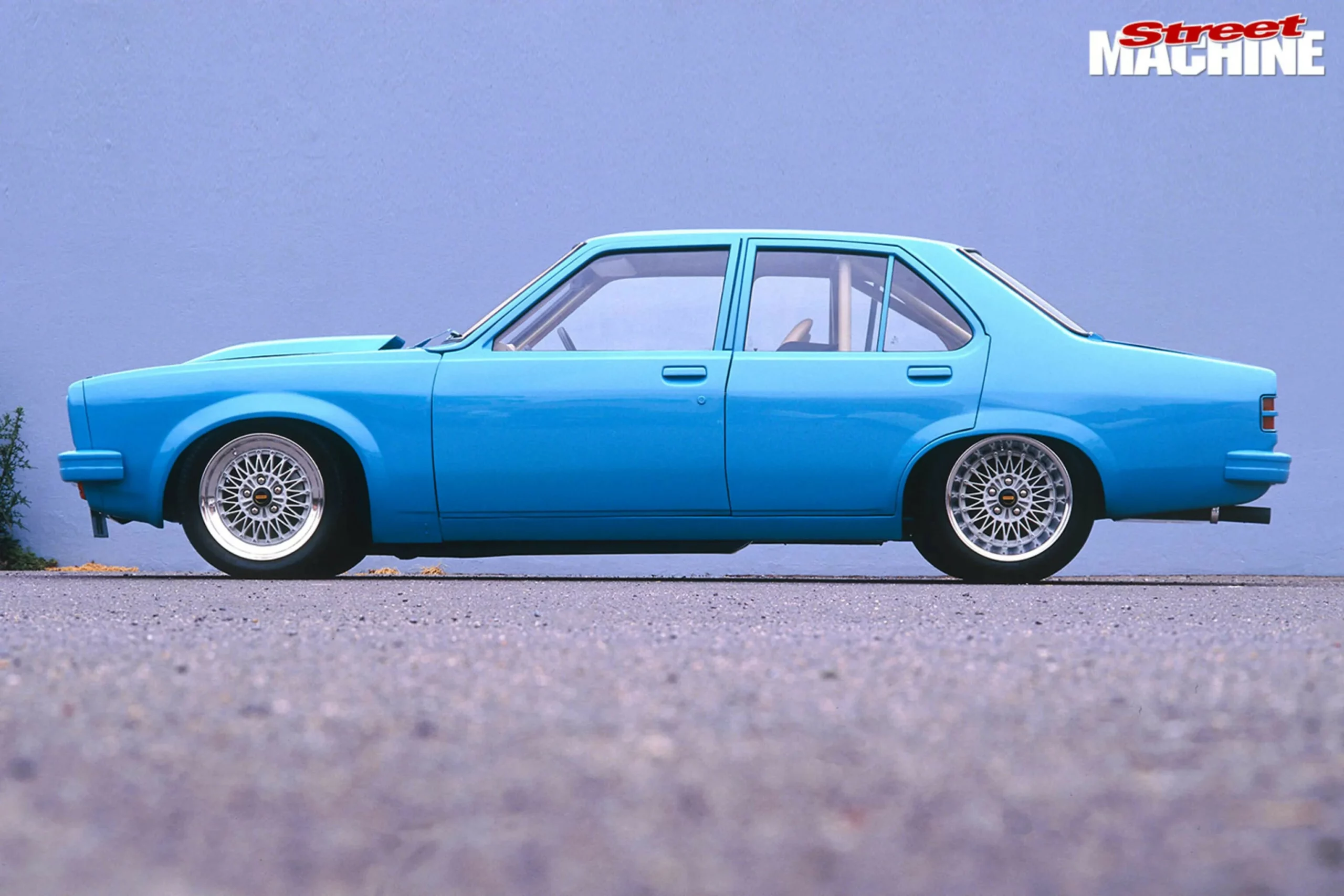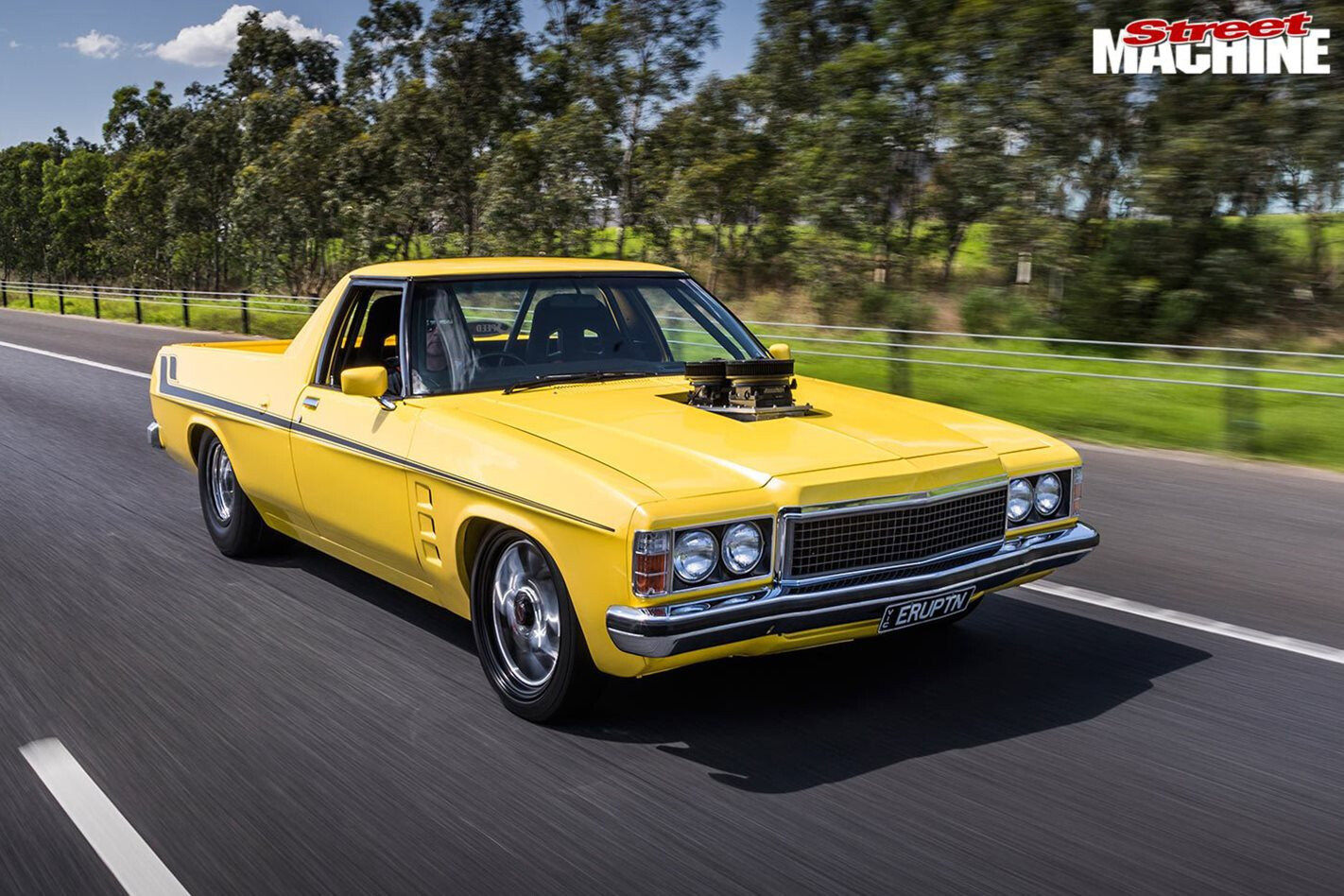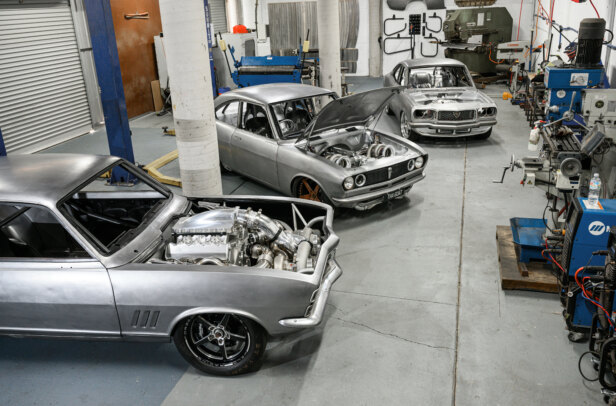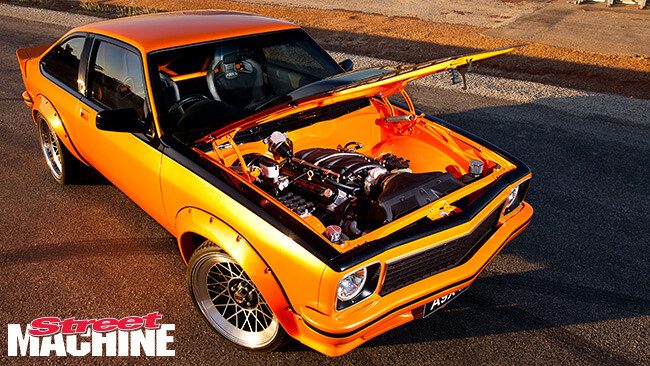AUSTRALIA’S pro touring scene is really building momentum at the moment, with an ever-increasing amount of aftermarket support and the world’s premier pro touring event, the Optima Search for the Ultimate Street Car, returning to our shores in 2021. With that in mind, we thought it appropriate to chat with one of the pioneers of Australian pro touring, Mark Sanders. Mark’s aluminium P76 V8-powered LH Torana (SM, Apr/May ’91) and stunning big-block HK Monaro (SM, Oct/Nov ’94) were both landmark builds back in the early 1990s and well ahead of their time – and he’s still tinkering today.
This article was first published in the August 2020 issue of Street Machine
How did the car bug bite you?
Although Dad wasn’t into cars, he took me to a few Touring Car races. When I saw Brock’s dominant Bathurst ’79 performance – he won by six laps and broke the lap record on the last lap – I was hooked. I’ve been into Holdens and going fast ever since. Ian Hazel lived a block away and his PREM70 HG wagon left a lasting impression – so subtle, yet so detailed, so well finished. A lot of the Monaro was inspired by PREM70. Later, I met Colin Townsend when I concreted his garage. He taught me a lot and taught me to learn a lot. Colin was part of a group building mega-fast cars that were registrable in South Australia, which was not easy. Many never got finished; mostly just Colin’s FJ, LEGAL8 (the EH I built for Neville Philips) and my Torana.
Another ageless streeter to bear the Sanders touch is Nev Philips’s LEGAL8 EH – said to be the first legal early Holden V8 in SA. It is regularly given a hiding at events like Targa Tasmania
So it’s all Colin’s fault?
Ha! He’s a clever man who had a lot to do with the original Torana build and me starting my business, RPM. For me, it was all about the engineering – how it worked rather than how it looked. Howard Astill and Ron Barclay changed that. Howard led me down the path of show cars, trophies, marketing and sponsorship. He’d just won the Street Machine Nationals, but me being young and brash, I started telling him his car was shit, with ladder bars and the like. Fortunately, he listened and challenged me to do better on ROCK 3. He came down to Adelaide, and we worked day and night for weeks doing the stainless four-link rear and double A-arm front with coil-overs all ’round – big stuff in its day. We became life-long friends and collaborated on the ROCK 4 Fairlane and RACE ROCK.
Did Howard motivate the white-to-blue rebuild of your Torana?
Yep. Took an engineering exercise and wrapped it in a pretty car. I started in late June after the Adelaide Hot Rod Show, and despite considerable changes (which included cutting away everything from the firewall forward), we made it to Summernats 4. The car scored Top 10, Top Pro Street and Top Pro Street Engineered.
We first featured Mark’s P76-powered Torana in the Dec ’90 issue. Back then it was white and was on the road and legal for just $12K and in eight months! It was back again in blue on the cover of the March ’91 mag, with the feature the issue after. Besides the colour change, the LH had copped a raft of improvements, including a full chassis, fabricated front suspension, UC dash, hidden wiper motor and a race-style pedal box
What about Ron Barclay?
I met Ronnie at the Street Machine Nats a few years later. Some petty officialdom wouldn’t let Ron into the hall and kept his ute sitting out in the mud and rain. Once in, we walked over and offered all our cleaning stuff, and we have been close friends ever since. Ron’s got a phenomenal eye and memory, able to spot and recall hundreds of flaws in seconds. He’s also the type of guy who doesn’t care how long something takes as long as it’s perfect. He really taught me detail – the Monaro owes a lot to him.
That’s a pretty strong group of friends!
At one stage, I think Howard, Ronnie and I won just about everything worth winning. None of us were tradespeople; none of what we did was learned in a classroom. Today’s parts were simply not available; for us it was all about hours and hours of fabrication. For example, I cut the Torana’s turret off to eliminate the rain gutters, which added a lot of weight up high – it was a massive job.
Mark’s Heatseeker HK is a timeless build – classy inside and out, but completely re-engineered underneath to meet the SA rego laws of the day. We’re talking 396ci big-block, Top Loader, four-link rear, double-wishbone front and a spectacular flat-floor undercarriage
Tell us about the build of your HK Monaro.
It came about by accident. I had the Torana at a Melbourne show, which I thought was going to be my last. Over the weekend I was offered tyres, wheels, a stereo and sponsorship should we choose to build another car. The following Summernats, I took along an artist’s rendition and a mock shell – and managed to pick up a couple more sponsors. I started the build in the shed that Easter and finished it in 21 months.
Where are the Monaro and Torana now?
I painted the Torana red, then sold it off a few years later. It’s still around; Steve Blackwell here in Adelaide owns it and makes the occasional appearance. To the best of my knowledge, James Scarlet still owns the Monaro.
What are some other cars that have influenced you?
A lot of circuit cars, plus Bill Lindig’s Indy Speedster. Oddly, while pro streeters have never done it for me, I was blown away by Rick Dobbertin’s Pontiac J2000 (above) – I’ve always admired one person’s passion to take things to the extreme. I reckon that car single-handedly killed pro street; no one could go any more extreme. It had super-wide custom-made tyres, over-the-top induction, polished stainless ’cage – after that, everyone had to admit defeat.
What projects do you have on the go at the moment?
A ’68 Karmann Ghia with Commodore V6, five-speed, full chassis and fully independent double-wishbone suspension. It’ll be elite quality, with a completely flat floor other than the four cut-outs for the wheelwells. Then there’s a 308-powered ’69 Mercedes 250SL ‘Pagoda’ (below). It’s rare and desirable – I bought it a long time ago cheap in really good condition. It’ll look stock and not be fast, but with a TH350 and BorgWarner rear, it’ll be far more reliable and serviceable.
One of Mark’s current projects is this 1969 250SL Merc. He’s building it as a cruiser, with the factory running gear turfed in favour of a 308/TH350 deal, an HG front end with a Commodore rack, and three- or four-link rear suspension with a Watt’s link
What are your thoughts on modern pro tourers?
I’m less than impressed with most. As an artform, yes, as the craftsmanship is unbelievable. Unfortunately, there’s no real ingenuity; most use generic components like ladder-type chassis – what’s with that? And what they lack in sophistication, they try to make up for with horsepower. They’ll typically cost more than something like a V10 R8 or C63, but both these cars will spank them hard.
Not a fan, then?
Don’t get me wrong, I love old clunkers. They have soul and evoke passion and lust; just don’t kid yourself into thinking they do anything particularly well. Then there’s the weight – real race cars take every ounce of weight they can and throw it in the bin. A lot of these big-dollar builds would weigh a tonne! Lightness breeds lightness; with barely 400hp, the Torana got away with a lightweight single-rail gearbox and BorgWarner rear end. And with every non-structural part drilled to reduce weight, it came in at 980kg. For the first 200 metres, nothing could catch it; it embarrassed a lot of cars. An 11-second car would catch it, but by then you’d already be at the next set of lights, or several corners down the road. Keeping it simple also keeps the budget down. If you don’t put it in your car, you don’t have to buy it, paint it, polish it or repair it.
“I knew the floor in the Merc was gone, but that didn’t worry me,” says Mark, “and replacement panels are readily available for the rest. Paint will be a factory Mercedes colour. Rims will be widened steelies with hubcaps, with the stance low but not too crazy”
What advice do you have for budding car crafters?
Build the car you want, but if you don’t put the engineering into it, it’s not going to be some kind of world-beater. Be wary of modifications for modifications’ sake, plus mismatched components. Good cars look like every part came out of the same factory. Also, religious fanaticism about brand X being better than brand Y is just silly. All our revered classics were built to a price and to the lowest common denominator. Even today’s modest performance cars do everything better – and so they should! Their engineering is so much more advanced – it’s not a fair comparison or a fair fight, it’s just a fact of life. Be realistic about your build budget and the end result. You’re never going to build a Ridler winner first time out – but you might the second time.




Comments